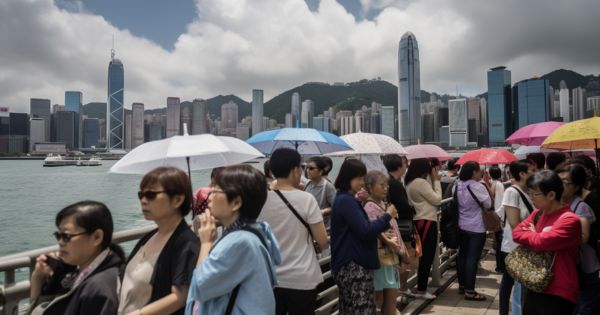Hong Kong Cryptocurrency Stores Become Emerging Attractions for Mainland Tourists
As cryptocurrency becomes more popular, Hong Kong has become a gray area for cryptocurrency trading in mainland China, attracting many Chinese tourists to purchase cryptocurrencies from physical cryptocurrency shops in Hong Kong, which have become a new attraction for these tourists.
Stay up-to-date with the latest cryptocurrency market trends and blockchain news and information by following CFTime page now.
These shops are usually located in tourist and shopping areas of the city, such as Tsim Sha Tsui, and are favored by Chinese tourists for their loose regulatory conditions and convenience of not requiring disclosure of funding sources or identity. The Financial Times reported that many Chinese tourists go to cryptocurrency shops inside shopping centers in Hong Kong to conduct transactions, and these shops are usually physical stores.
These shops often accept cash payments and do not overly verify the identity and funding sources of customers during transactions. The convenience and low threshold of these shops attract many Chinese tourists to purchase cryptocurrencies.
With cryptocurrency trading banned in mainland China but legal in Hong Kong, many Chinese tourists choose to go to Hong Kong for cryptocurrency trading. Some even travel specifically to Hong Kong to purchase cryptocurrencies, and the number of these tourists has increased in recent times.
Before the full reopening of the border between China and Hong Kong in February, mainland customers accounted for "less than 5%" of Crypto HK's (an off-exchange cryptocurrency company with two branches in Hong Kong) customer base, according to the company's founder Merton Lam. "Now it might be half," he said.
Roger Li, co-founder of One Satoshi, said the company's total trading volume from January to May increased by about 20% to 25% year-on-year. He expects the annual trading volume to increase by 35% to 40%.
Li said he does not accept mainland customers because he is concerned about Beijing's cryptocurrency ban, but he is optimistic that restrictions will be relaxed - a belief widely held in the Hong Kong cryptocurrency community after the city announced its plan to become a virtual asset center.
Li said about 30% of new inquiries actually come from the mainland, and he advises them that they will soon be able to trade with us because the regulatory landscape in China may change.
However, the regulatory status of these cryptocurrency shops remains in a gray area. In Hong Kong, cryptocurrency trading is legal, but most cryptocurrency shops are not regulated by the Securities and Futures Commission of Hong Kong. Therefore, whether these shops comply with regulations such as anti-money laundering and counter-terrorism financing has become an issue.
Regulatory agencies have said that they are working with other regulatory agencies to ensure that the regulatory framework continues to evolve to adapt to the constantly changing cryptocurrency market.
Although the regulatory status of cryptocurrency shops is a gray area, these shops remain a convenient option for Chinese tourists who need to purchase cryptocurrencies in Hong Kong. However, these shops also need to be aware of the importance of regulation and ensure that they comply with relevant regulations to avoid potential risks.
For the Chinese government, cryptocurrency regulation has also become an important issue. In recent years, the Chinese government has strengthened its regulation of cryptocurrencies, banning cryptocurrency trading and initial coin offerings (ICOs) and closing many cryptocurrency exchanges. However, these measures have not stopped the interest and demand for cryptocurrencies among the Chinese people.
Hong Kong's cryptocurrency companies have attracted the attention of the Bank of China, highlighting the starkly different attitudes toward cryptocurrency between China and Hong Kong. This divergence further strengthens Hong Kong's unique position in the global cryptocurrency landscape.





